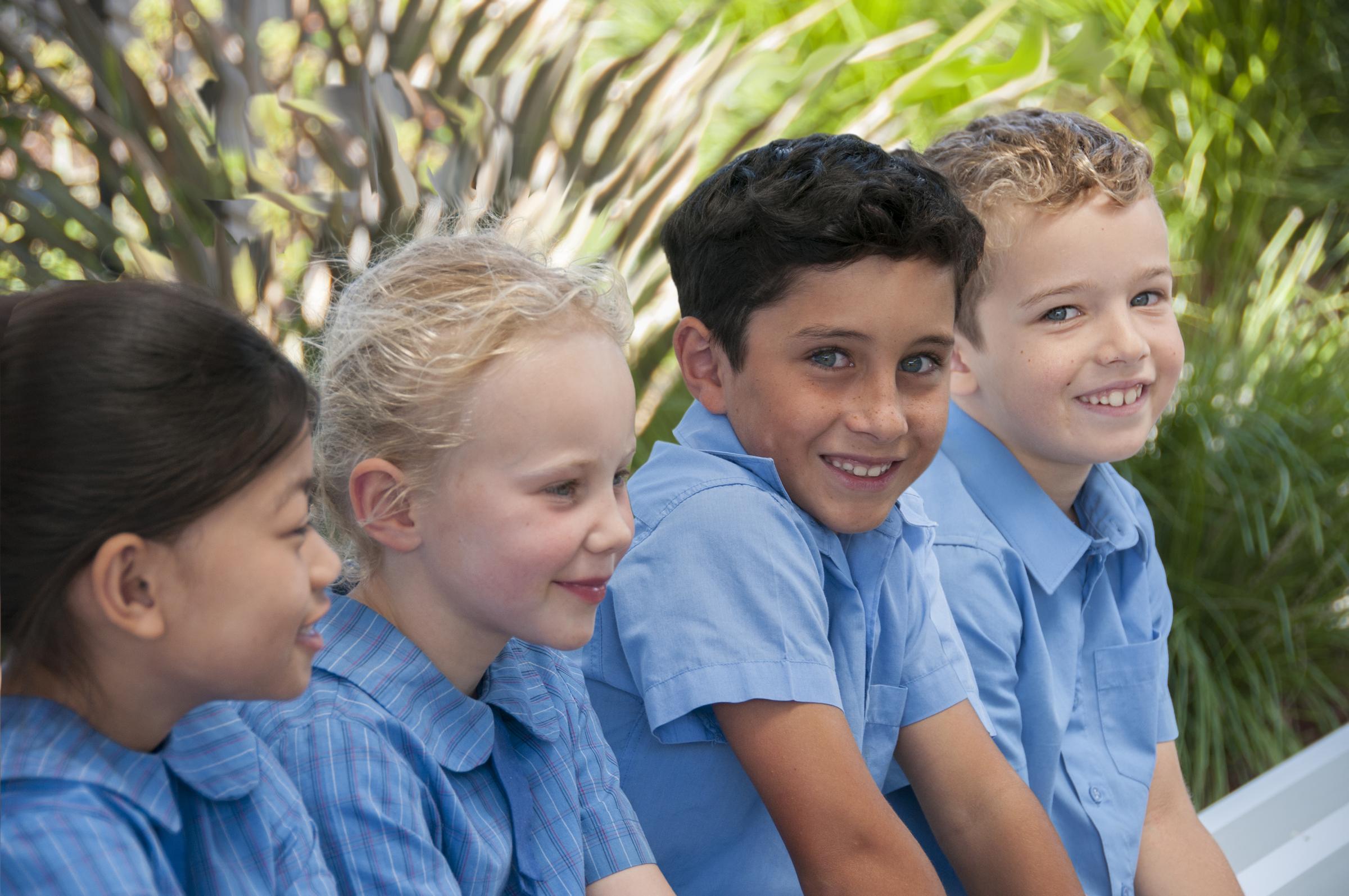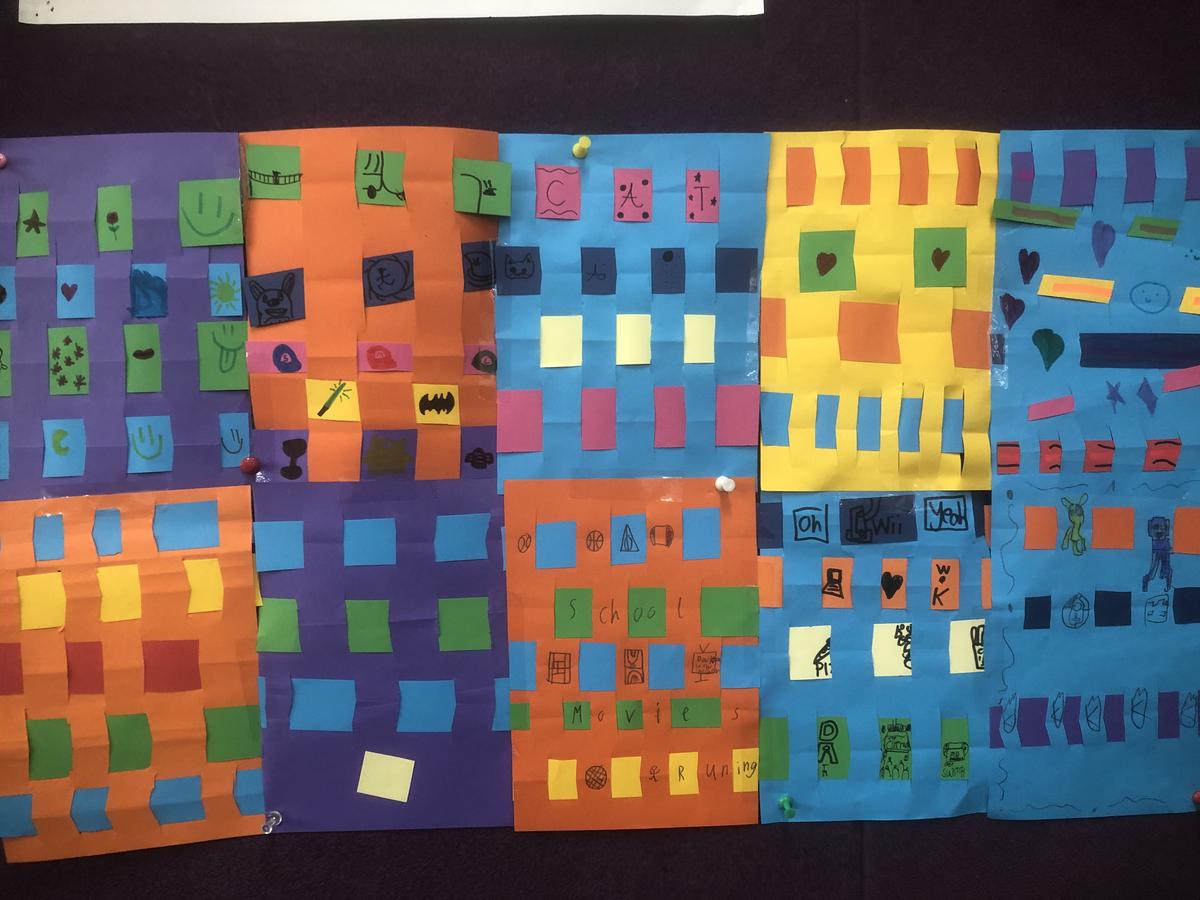Student Well-being

Year 3/4 Community
In the Year 3/4 Community, students have been exploring the differences between feelings and emotions, focusing on how our bodies, facial expressions, and actions can reflect these emotions. They observed both the classroom and playground environments, learning to identify these emotional cues. Additionally, they worked on building personal strengths through team games.
As part of the Bullying No Way National Week of Action, we emphasized the importance of safety and belonging in our school community. Students created weaves to represent how, despite our differences, we all contribute to the same community. They also filled out speech bubbles with the sentence starter, "I pledge to prevent bullying by..." Check out some of their thoughtful responses!
"I pledge to help prevent bullying.. by being an upstander for those experiencing bullying"
"I pledge to help prevent bullying.. letting everyone experience a world without racism"
"I pledge to help prevent bullying.. including people in my game and being nice to one another"
Conversation skills for children: learning to talk and listen to others
Conversation skills: what they are and why they’re important
Conversation skills are important for children’s development and wellbeing. When children can have conversations, they can make friends, be listened to, ask for what they need and develop strong relationships with others.
Conversation skills are about being able to talk and listen well. This involves:
- starting conversations – for example, by saying ‘Hello’ or asking a question
- getting attention in a respectful way – for example, by saying ‘Excuse me’
- using eye contact
- knowing what to talk about
- taking turns talking and listening
- speaking respectfully
- knowing when to stop talking.
Role-modelling conversation skills for children
Your child learns a lot about conversations from talking and listening with you. So you can help your child develop conversation skills by talking with your child whenever you can.
You child also learns by watching your conversations with others. So you can help your child develop good conversation skills by talking to your partner, other adults and children in the way you’d like your child to talk with others. For example:
- Smile, make eye contact and use friendly greetings. For example, say ‘Good morning’ to the family, ‘Welcome’ to visitors and ‘How are you?’ to people in the community.
- Use body language and tone of voice to show interest and attention when you talk to others.
- If someone wants to talk with you and you’re using your phone, put it down or let them know you’ll be with them in a moment. This way you can give the other person your full attention.
Practice, prompts and guidance for children’s conversation skills
Learning how to talk with and listen to other people takes time and practice. Some children pick this up quickly, and others might need support from you.
Practice
- Have practice conversations with your child where you take turns asking questions and listening to answers.
- Rehearse things your child could say when they’re going to a social event. For example, ‘Hello Nola. Would you like to play on the swing with me?’
- Suggest or brainstorm things your child could say when they meet someone new. For example, ‘Hello. My name is Veronica. I have a dog at my house. Do you have a pet?’
Prompts
- Prompt your child. For example, ‘Please say thank you to Grandma for taking you to the park’.
- Use clear and gentle reminders when you need to. For example, ‘Rani, please look at me when you’re speaking to me’.
- Suggest how your child could begin a conversation about someone else’s interests. For example, ‘Uncle Zak just bought a new car. He’d like it if you asked him about his car today’.
Guidance
- Make family rules about respectful speaking and conversation. Discuss these with your child so they understand what’s expected.
- Guide your child. For example, ‘Sarah, if I’m speaking to someone you need to say “Excuse me”, and then wait until I’m ready to listen’.
- Praise children when they’re communicating well. This will make them want to keep doing it. For example, ‘I love the way you waited for me to finish speaking before you started talking’. Or ‘You did really well with your pleases and thank yous just now’.
- Use consequences if your child is talking back or speaking rudely.
Managing interrupting
Interrupting usually happens when children can’t control their urge to talk. But unless it’s an emergency, it’s important to help your child learn to wait. Letting others finish what they’re saying or doing is part of positive and respectful communication and helps children get along with others.
The way you manage interrupting will depend on your child’s age and stage of development. For example, younger children and children with additional needs might find it hard to understand that they should say ‘Excuse me’ and wait for you to respond. Preschoolers might be able to cope only with a quick ‘Just a minute’ before you give them your attention. School-age children should be able to wait for longer.
These general tips for managing interruptions will help most children:
- Let your child know when it’s OK to interrupt immediately. For example, if something dangerous or urgent is happening, they should be allowed to interrupt.
- Teach your child to put their hand on your arm if they need to say something while you’re talking. Then you can put your other hand on top of theirs to let them know that you’ve understood.
When your child gets older and you know they can wait, you can try these ideas to manage interruptions:
- Remind your child of your family rule about interrupting. Then continue your conversation until your child says ‘Excuse me’ or puts their hand on your arm.
- When your child says ‘Excuse me’, try to reward your child with your attention quickly. Your child will see that if they do the right thing, they get what they want.
- Praise your child when they say ‘Excuse me’ and wait for you to give them your attention. This encourages your child to keep speaking this way. For example, ‘You waited until I finished my call before you asked for help with your doll. Well done!’
- If you have an important call or activity that can’t be interrupted, try distracting your child with a special toy or an interesting activity or let them know how long you’ll be.
Dealing with talking back or backchat
Your child might talk back when you set limits, give instructions or give consequences. For example, they might use a rude tone of voice, argue or try to negotiate when it’s not appropriate.
If this happens, the first thing is to respond calmly and remind your child of your family rules about speaking respectfully and treating each other with respect.
And then if your child keeps being rude, give a consequence for the rudeness. This could be anything from practising another way to speak to losing a privilege like screen time.
Things that affect children’s conversation skills
There are things that might affect how children develop conversation skills:
- Self-regulation – this includes the ability to manage your behaviour and your reactions to things happening round you. It’s an important part of learning to talk and listen. Children develop self-regulation as they grow.
- Temperament – for example, a very social child might want to be involved in every conversation and have trouble listening. On the other hand, a child who is shy or slow to warm up might find it easier to listen but harder to respond.
- Autism and other additional needs – for example, autistic children have a range of communication skills but might need support to learn and practise their skills. Children with deafness and hearing loss might need specialised support.
Article taken from: https://raisingchildren.net.au/
Lauren Borg
Student Well-being Leader




